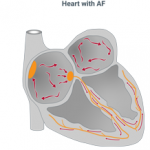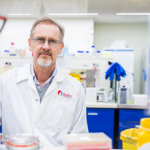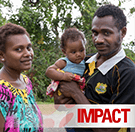COVID-19 continues to dominate research as we track the trends, investigate cures, explore vaccine side-effects and analyse the current Melbourne outbreak and lockdowns, as well as track its impact on the treatment of other diseases. Our researchers link climate change to increased mortality rates, help us stay ahead of hepatitis C and explore a new STI in PNG, while others review the link between atrial enlargement and atrial fibrillation, explain vascular ageing and celebrate a grant to help tackle heart disease. Plus, we celebrate smoke-free lifestyles on World No Tobacco Day. Here’s what’s happened this week at the Alfred Research Alliance.
ALFRED HEALTH
Celebrating Smoke Free Status on World No Tobacco Day
 Rami knew his birthday fell on World No Tobacco Day, and after smoking two packs a day for 20 years, he’s happy to say that this year he’s finally celebrating a smoke free lifestyle, after working with the Smokefree Clinic team at The Alfred. Want to quite too? Visit www.quit.org.au or call Quitline on 13 7848 – and if you’re an Alfred patient, click here for access to the clinic. Read more….
Rami knew his birthday fell on World No Tobacco Day, and after smoking two packs a day for 20 years, he’s happy to say that this year he’s finally celebrating a smoke free lifestyle, after working with the Smokefree Clinic team at The Alfred. Want to quite too? Visit www.quit.org.au or call Quitline on 13 7848 – and if you’re an Alfred patient, click here for access to the clinic. Read more….
MONASH CENTRAL CLINICAL SCHOOL
Identifying likely targets for SARS-CoV-2 using multimodal data analysis
 Thousands of studies have been done into SARS-CoV-2 over the past 15 months, but we still have much to learn. Dr Sonika Tyagi from the Dept of Infectious Diseases, is working with colleagues at the University of Melbourne to identify drug target molecules, develop new strategies and software to analyse multiple types of data to identify effective drug target molecules – with the goal of developing more effective treatments. Read more…
Thousands of studies have been done into SARS-CoV-2 over the past 15 months, but we still have much to learn. Dr Sonika Tyagi from the Dept of Infectious Diseases, is working with colleagues at the University of Melbourne to identify drug target molecules, develop new strategies and software to analyse multiple types of data to identify effective drug target molecules – with the goal of developing more effective treatments. Read more…
Victoria’s COVID-19 lockdown – interesting background on ‘getting ahead of the spread’
 Last week, Victoria’s Acting Premier announced a 7-day “circuit-breaker” lockdown to help authorities get on top of the most recent COVID-19 outbreak. Since then, the situation has evolved very quickly, with a second lockdown announced. Before that new announcement, Dr Michael Lydeamore from the Dept of Infectious Diseases at The Alfred and Monash CCS, put together an interesting and informative background piece, which you can read here…
Last week, Victoria’s Acting Premier announced a 7-day “circuit-breaker” lockdown to help authorities get on top of the most recent COVID-19 outbreak. Since then, the situation has evolved very quickly, with a second lockdown announced. Before that new announcement, Dr Michael Lydeamore from the Dept of Infectious Diseases at The Alfred and Monash CCS, put together an interesting and informative background piece, which you can read here…
MONASH SCHOOL OF PUBLIC HEALTH AND PREVENTIVE MEDICINE
Climate change is contributing to increased mortality rates
 Head of the SPHPM Climate, Air Quality Research Unit, Prof Yuming Guo, has collaborated with international colleagues on a major study which shows for the first time the actual contribution of man-made climate change in increasing mortality risks due to heat. Led by the University of Bern and the London School of Hygiene & Tropical Medicine, the study is the largest of this kind, used data from 732 cities in 43 countries around the world. Read more…
Head of the SPHPM Climate, Air Quality Research Unit, Prof Yuming Guo, has collaborated with international colleagues on a major study which shows for the first time the actual contribution of man-made climate change in increasing mortality risks due to heat. Led by the University of Bern and the London School of Hygiene & Tropical Medicine, the study is the largest of this kind, used data from 732 cities in 43 countries around the world. Read more…
BAKER HEART AND DIABETES INSTITUTE
Vascular ageing: What it is, and why it matters
 Most of us know that high blood pressure and high cholesterol levels are risk factors for heart disease. Dr Rachel Climie would like us to add vascular ageing to that list. The Heart Foundation Postdoctoral Fellow based in the Sports Cardiology laboratory at the Baker Institute says that early vascular ageing is an issue that society needs to start thinking about. Read more in this article originally published in Tonic…
Most of us know that high blood pressure and high cholesterol levels are risk factors for heart disease. Dr Rachel Climie would like us to add vascular ageing to that list. The Heart Foundation Postdoctoral Fellow based in the Sports Cardiology laboratory at the Baker Institute says that early vascular ageing is an issue that society needs to start thinking about. Read more in this article originally published in Tonic…
How rare are blood clots after the AstraZeneca vaccine?
 With COVID-19 community transmission on the rise once again, those aged over 50 are weighing up the benefits of being vaccinated against the virus with the very rare risk of blood clotting induced by the AstraZeneca vaccine. Our understanding of the clotting disorder associated with the vaccine has grown over recent time and we now know how to diagnose and treat it. This article, which originally appeared in The Conversation, explains. Read more…
With COVID-19 community transmission on the rise once again, those aged over 50 are weighing up the benefits of being vaccinated against the virus with the very rare risk of blood clotting induced by the AstraZeneca vaccine. Our understanding of the clotting disorder associated with the vaccine has grown over recent time and we now know how to diagnose and treat it. This article, which originally appeared in The Conversation, explains. Read more…
Understanding atrial enlargement to prevent atrial fibrillation
 Baker Institute researchers led by Prof Julie McMullen, Prof Tom Marwick and colleagues, have led a scientific review into atrial enlargement — expansion of the upper chambers of the heart — to highlight the need for more research to prevent, diagnose & treat atrial fibrillation. The review highlights the need to better understand the different features and mechanisms responsible for atrial enlargement, to allow for earlier intervention. Read more…
Baker Institute researchers led by Prof Julie McMullen, Prof Tom Marwick and colleagues, have led a scientific review into atrial enlargement — expansion of the upper chambers of the heart — to highlight the need for more research to prevent, diagnose & treat atrial fibrillation. The review highlights the need to better understand the different features and mechanisms responsible for atrial enlargement, to allow for earlier intervention. Read more…
The pandemic’s effect on diabetes care
 New Australian research has provided a window into how the COVID-19 pandemic has impacted on the lives of people with type 2 diabetes. The most worrying findings by the Baker Institute show a reduction in people accessing routine medical care. Of the nearly 500 people with type 2 diabetes who took part in the survey, two in five reported cancelling necessary medical appointments and avoiding making new ones. Read more…
New Australian research has provided a window into how the COVID-19 pandemic has impacted on the lives of people with type 2 diabetes. The most worrying findings by the Baker Institute show a reduction in people accessing routine medical care. Of the nearly 500 people with type 2 diabetes who took part in the survey, two in five reported cancelling necessary medical appointments and avoiding making new ones. Read more…
Advancing early identification and treatment of heart disease
 A major grant to advance the use of metabolic and genetic scoring to help in the early identification and treatment of heart disease has been awarded to Baker Institute scientists. A Heart Foundation Strategic Grant of nearly $1 million will allow development of a personalised metabolic risk score to prevent cardiovascular disease, and software to effectively deliver risk information to patients and doctors. Read more…
A major grant to advance the use of metabolic and genetic scoring to help in the early identification and treatment of heart disease has been awarded to Baker Institute scientists. A Heart Foundation Strategic Grant of nearly $1 million will allow development of a personalised metabolic risk score to prevent cardiovascular disease, and software to effectively deliver risk information to patients and doctors. Read more…
BURNET INSTITUTE
New STI affecting pregnant women in PNG
 Amid, and despite, the COVID-19 pandemic, Burnet’s Healthy Mothers, Healthy Babies (HMHB) team is continuing its outstanding work to address the underlying causes for the appalling level of death and disease among women and children in PNG. Dr Michelle Scoullar recently conducted a study identifying the high burden of a new STI – Mycoplasma genitalium – that has not been previously identified in PNG. Read more…
Amid, and despite, the COVID-19 pandemic, Burnet’s Healthy Mothers, Healthy Babies (HMHB) team is continuing its outstanding work to address the underlying causes for the appalling level of death and disease among women and children in PNG. Dr Michelle Scoullar recently conducted a study identifying the high burden of a new STI – Mycoplasma genitalium – that has not been previously identified in PNG. Read more…
Staying ahead of the Hepatitis C curve
 How do you get people to take curative medication for a disease they don’t know they have? EC Australia partner organisations are using creative strategies to find, test and treat key Australian populations affected with hepatitis C. Many do not know they are infected, or that they could be cured – but better education can improve quality of life for patients who might otherwise never access treatment. Read more…
How do you get people to take curative medication for a disease they don’t know they have? EC Australia partner organisations are using creative strategies to find, test and treat key Australian populations affected with hepatitis C. Many do not know they are infected, or that they could be cured – but better education can improve quality of life for patients who might otherwise never access treatment. Read more…
COVID-19 global trends and analysis snapshot now available
 Burnet Institute has released its May 2021 snapshot of global epidemiology and trends, as well as science snapshots. With 171 million global cases and 3.6 million deaths to date, the vital data shows that case numbers continue to surge in Asia and South America, while Europe and North America are in decline – and highlights the implications for Australia’s response. Read more…
Burnet Institute has released its May 2021 snapshot of global epidemiology and trends, as well as science snapshots. With 171 million global cases and 3.6 million deaths to date, the vital data shows that case numbers continue to surge in Asia and South America, while Europe and North America are in decline – and highlights the implications for Australia’s response. Read more…
